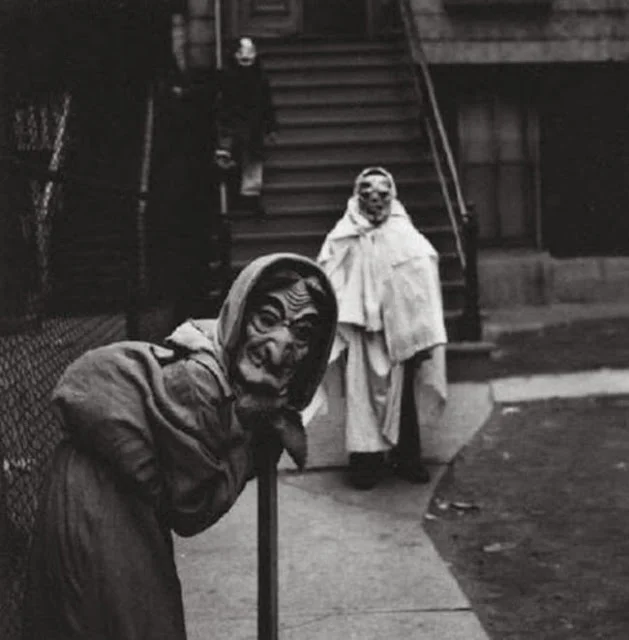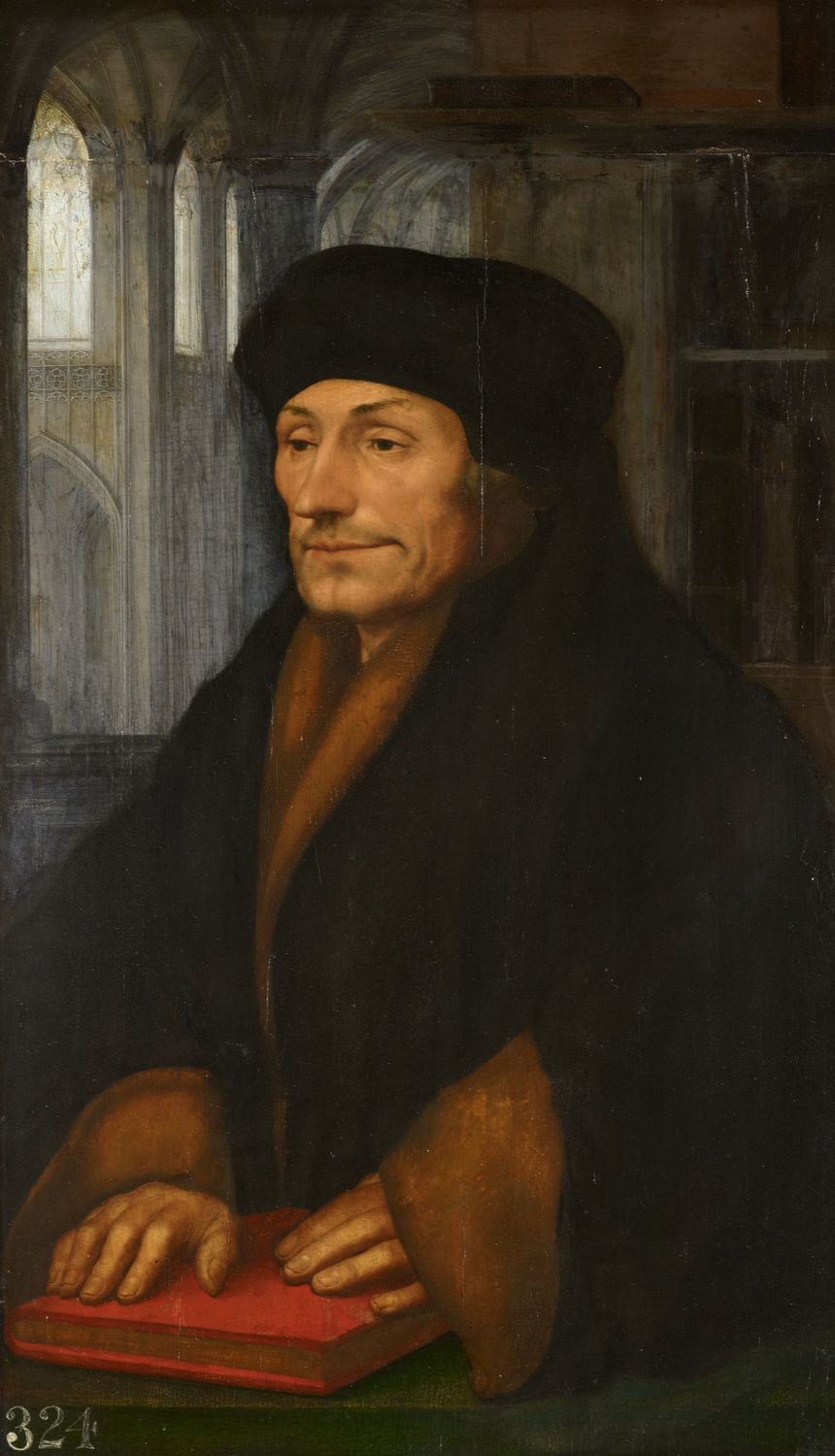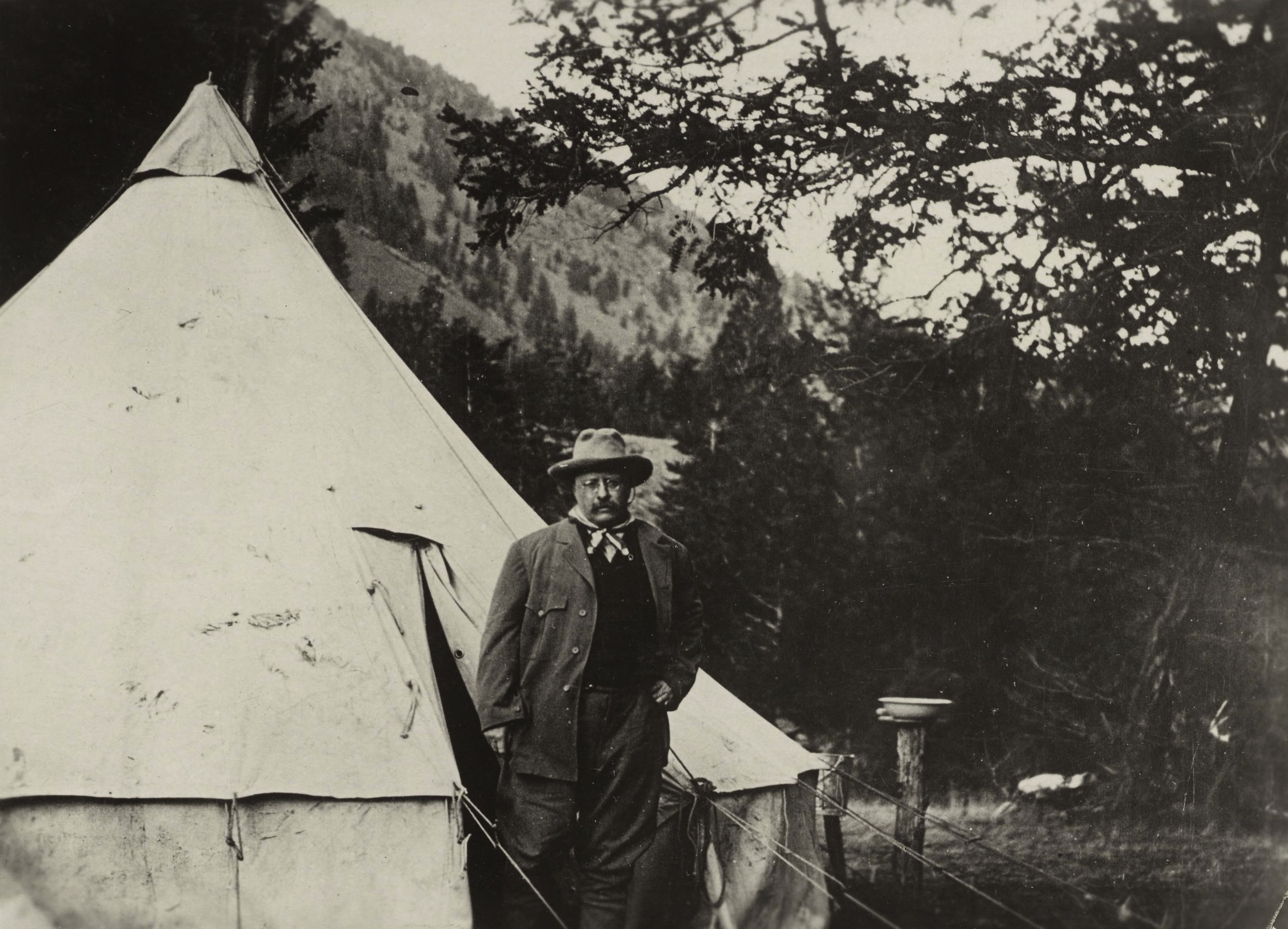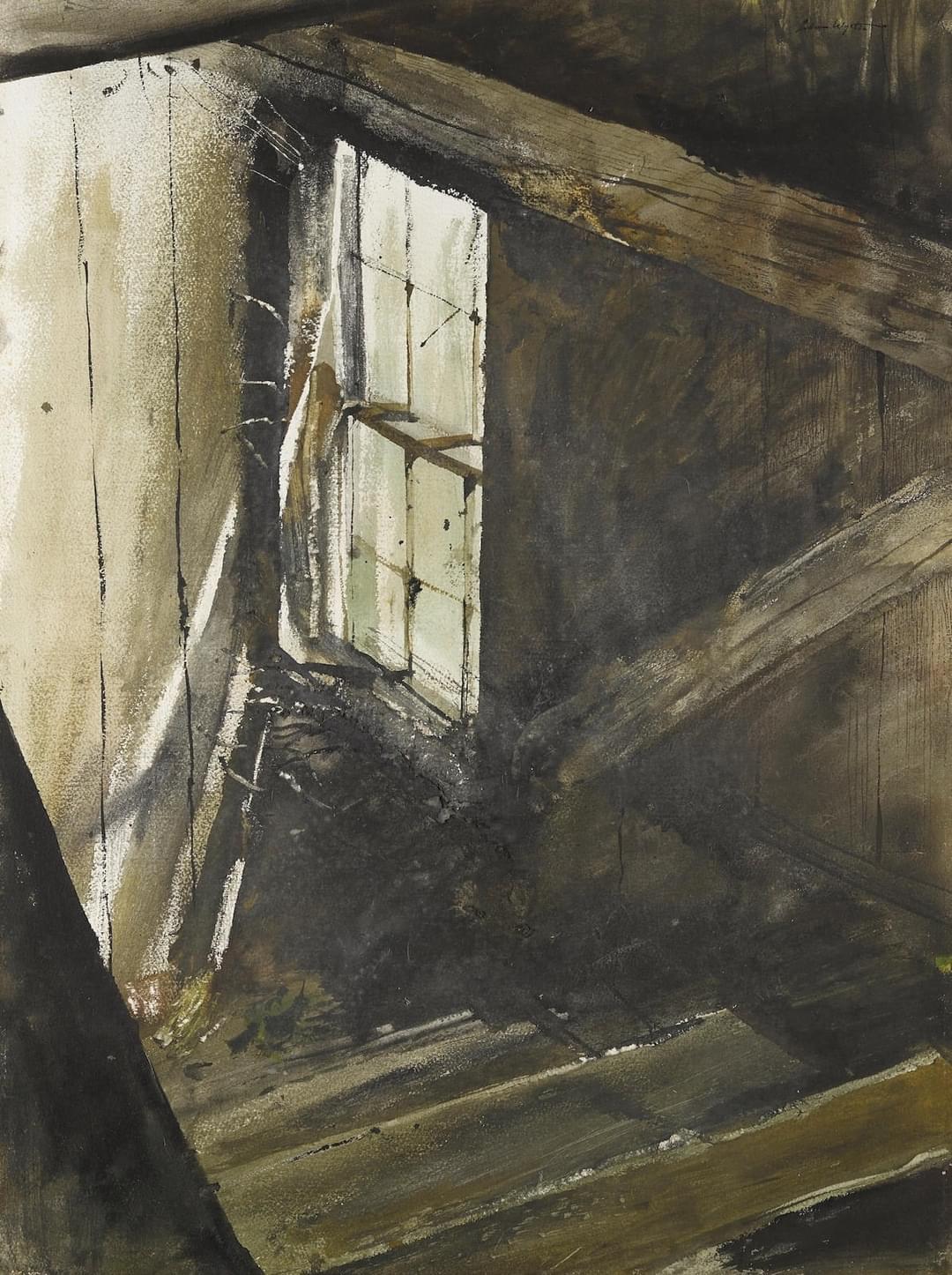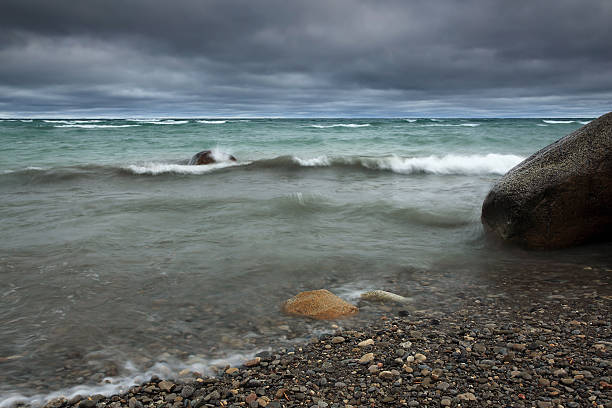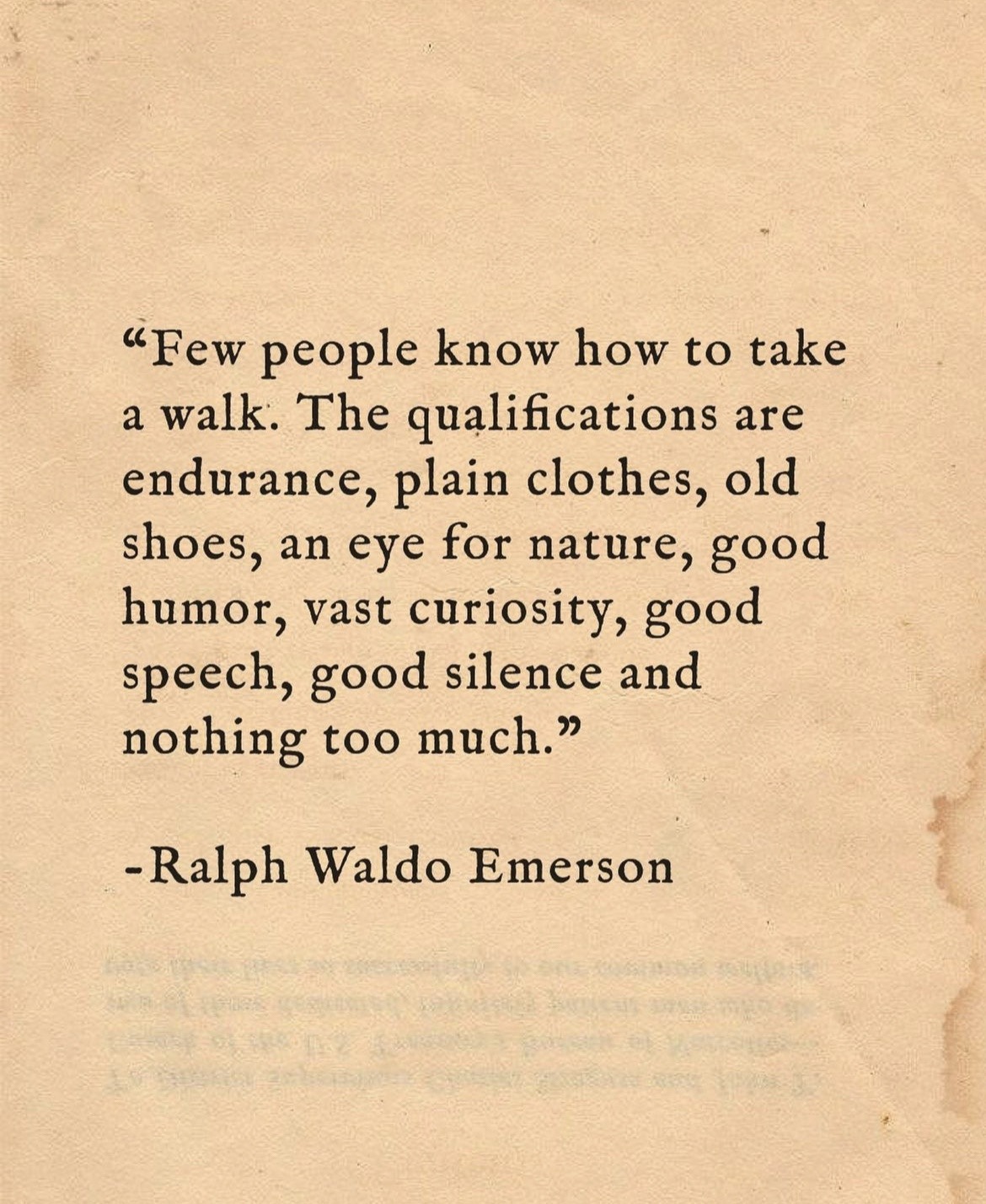31 October 2023
Folk.
Wyeth, Bonfire, 1996
Keep your eyes open
And prick up your ears
Rehearse your loudest cry.
There's folk out there
Who would do you harm
So I'll sing you no lullaby.
There's a lock on the window;
There's a chain on the door:
A big dog in the hall.
But there's dragons and beasties
Out there in the night
To snatch you if you fall.
Jethro Tull, from "No Lullabye," off Heavy Horses
Gabs-A-Steerin'.
HALLOWEEN
Upon that night, when fairies light
On Cassilis Downans dance,
Or owre the lays, in splendid blaze,
On sprightly coursers prance;
Or for Colean the route is ta'en,
Beneath the moon's pale beams;
There, up the cove, to stray and rove,
Among the rocks and streams
To sport that night.
Among the bonny winding banks,
Where Doon rins, wimplin' clear,
Where Bruce ance ruled the martial ranks,
And shook his Carrick spear,
Some merry, friendly, country-folks,
Together did convene,
To burn their nits, and pou their stocks,
And haud their Halloween
Fu' blithe that night.
The lasses feat, and cleanly neat,
Mair braw than when they're fine;
Their faces blithe, fu' sweetly kythe,
Hearts leal, and warm, and kin';
The lads sae trig, wi' wooer-babs,
Weel knotted on their garten,
Some unco blate, and some wi' gabs,
Gar lasses' hearts gang startin'
Whiles fast at night.
Then, first and foremost, through the kail,
Their stocks maun a' be sought ance;
They steek their een, and graip and wale,
For muckle anes and straught anes.
Poor hav'rel Will fell aff the drift,
And wander'd through the bow-kail,
And pou't, for want o' better shift,
A runt was like a sow-tail,
Sae bow't that night.
Then, staught or crooked, yird or nane,
They roar and cry a' throu'ther;
The very wee things, todlin', rin,
Wi' stocks out owre their shouther;
And gif the custoc's sweet or sour.
Wi' joctelegs they taste them;
Syne cozily, aboon the door,
Wi cannie care, they've placed them
To lie that night.
The lasses staw frae 'mang them a'
To pou their stalks of corn:
But Rab slips out, and jinks about,
Behint the muckle thorn:
He grippet Nelly hard and fast;
Loud skirl'd a' the lasses;
But her tap-pickle maist was lost,
When kitlin' in the fause-house
Wi' him that night.
The auld guidwife's well-hoordit nits,
Are round and round divided,
And monie lads' and lasses' fates
Are there that night decided:
Some kindle coothie, side by side,
And burn thegither trimly;
Some start awa, wi' saucy pride,
And jump out-owre the chimlie
Fu' high that night.
Jean slips in twa wi' tentie ee;
Wha 'twas she wadna tell;
But this is Jock, and this is me,
She says in to hersel:
He bleezed owre her, and she owre him,
As they wad never mair part;
Till, fuff! he started up the lum,
And Jean had e'en a sair heart
To see't that night.
Poor Willie, wi' his bow-kail runt,
Was brunt wi' primsie Mallie;
And Mallie, nae doubt, took the drunt,
To be compared to Willie;
Mall's nit lap out wi' pridefu' fling,
And her ain fit it brunt it;
While Willie lap, and swore by jing,
'Twas just the way he wanted
To be that night.
Nell had the fause-house in her min',
She pits hersel and Rob in;
In loving bleeze they sweetly join,
Till white in ase they're sobbin';
Nell's heart was dancin' at the view,
She whisper'd Rob to leuk for't:
Rob, stowlins, prie'd her bonny mou',
Fu' cozie in the neuk for't,
Unseen that night.
But Merran sat behint their backs,
Her thoughts on Andrew Bell;
She lea'es them gashin' at their cracks,
And slips out by hersel:
She through the yard the nearest taks,
And to the kiln goes then,
And darklins graipit for the bauks,
And in the blue-clue throws then,
Right fear't that night.
And aye she win't, and aye she swat,
I wat she made nae jaukin',
Till something held within the pat,
Guid Lord! but she was quakin'!
But whether 'was the deil himsel,
Or whether 'twas a bauk-en',
Or whether it was Andrew Bell,
She didna wait on talkin'
To spier that night.
Wee Jennie to her grannie says,
"Will ye go wi' me, grannie?
I'll eat the apple at the glass
I gat frae Uncle Johnnie:"
She fuff't her pipe wi' sic a lunt,
In wrath she was sae vap'rin',
She notice't na, an aizle brunt
Her braw new worset apron
Out through that night.
"Ye little skelpie-limmer's face!
I daur you try sic sportin',
As seek the foul thief ony place,
For him to spae your fortune.
Nae doubt but ye may get a sight!
Great cause ye hae to fear it;
For mony a ane has gotten a fright,
And lived and died deleeret
On sic a night.
"Ae hairst afore the Sherramoor, —
I mind't as weel's yestreen,
I was a gilpey then, I'm sure
I wasna past fifteen;
The simmer had been cauld and wat,
And stuff was unco green;
And aye a rantin' kirn we gat,
And just on Halloween
It fell that night.
"Our stibble-rig was Rab M'Graen,
A clever sturdy fallow:
His son gat Eppie Sim wi' wean,
That lived in Achmacalla:
He gat hemp-seed, I mind it weel,
And he made unco light o't;
But mony a day was by himsel,
He was sae sairly frighted
That very night."
Then up gat fechtin' Jamie Fleck,
And he swore by his conscience,
That he could saw hemp-seed a peck;
For it was a' but nonsense.
The auld guidman raught down the pock,
And out a hanfu' gied him;
Syne bade him slip frae 'mang the folk,
Some time when nae ane see'd him,
And try't that night.
He marches through amang the stacks,
Though he was something sturtin;
The graip he for a harrow taks.
And haurls it at his curpin;
And every now and then he says,
"Hemp-seed, I saw thee,
And her that is to be my lass,
Come after me, and draw thee
As fast this night."
He whistled up Lord Lennox' march
To keep his courage cheery;
Although his hair began to arch,
He was say fley'd and eerie:
Till presently he hears a squeak,
And then a grane and gruntle;
He by his shouther gae a keek,
And tumbled wi' a wintle
Out-owre that night.
He roar'd a horrid murder-shout,
In dreadfu' desperation!
And young and auld came runnin' out
To hear the sad narration;
He swore 'twas hilchin Jean M'Craw,
Or crouchie Merran Humphie,
Till, stop! she trotted through them
And wha was it but grumphie
Asteer that night!
Meg fain wad to the barn hae gaen,
To win three wechts o' naething;
But for to meet the deil her lane,
She pat but little faith in:
She gies the herd a pickle nits,
And two red-cheekit apples,
To watch, while for the barn she sets,
In hopes to see Tam Kipples
That very nicht.
She turns the key wi cannie thraw,
And owre the threshold ventures;
But first on Sawnie gies a ca'
Syne bauldly in she enters:
A ratton rattled up the wa',
And she cried, Lord, preserve her!
And ran through midden-hole and a',
And pray'd wi' zeal and fervour,
Fu' fast that night;
They hoy't out Will wi' sair advice;
They hecht him some fine braw ane;
It chanced the stack he faddom'd thrice
Was timmer-propt for thrawin';
He taks a swirlie, auld moss-oak,
For some black grousome carlin;
And loot a winze, and drew a stroke,
Till skin in blypes cam haurlin'
Aff's nieves that night.
A wanton widow Leezie was,
As canty as a kittlin;
But, och! that night amang the shaws,
She got a fearfu' settlin'!
She through the whins, and by the cairn,
And owre the hill gaed scrievin,
Whare three lairds' lands met at a burn
To dip her left sark-sleeve in,
Was bent that night.
Whyles owre a linn the burnie plays,
As through the glen it wimpl't;
Whyles round a rocky scaur it strays;
Whyles in a wiel it dimpl't;
Whyles glitter'd to the nightly rays,
Wi' bickering, dancing dazzle;
Whyles cookit underneath the braes,
Below the spreading hazel,
Unseen that night.
Among the brackens, on the brae,
Between her and the moon,
The deil, or else an outler quey,
Gat up and gae a croon:
Poor Leezie's heart maist lap the hool!
Near lav'rock-height she jumpit;
but mist a fit, and in the pool
Out-owre the lugs she plumpit,
Wi' a plunge that night.
In order, on the clean hearth-stane,
The luggies three are ranged,
And every time great care is ta'en',
To see them duly changed:
Auld Uncle John, wha wedlock joys
Sin' Mar's year did desire,
Because he gat the toom dish thrice,
He heaved them on the fire
In wrath that night.
Wi' merry sangs, and friendly cracks,
I wat they didna weary;
And unco tales, and funny jokes,
Their sports were cheap and cheery;
Till butter'd so'ns, wi' fragrant lunt,
Set a' their gabs a-steerin';
Syne, wi' a social glass o' strunt,
They parted aff careerin'
Fu' blythe that night.
Robert Burns
29 October 2023
Eternity.
In my view the man who wrote most wisely about what good architecture means to culture was Sir Christopher Wren. Few people know that Wren wrote anything about architecture; but this is what he said, in his Parentalia:
Architecture has its political use. Public buildings being the ornament of a country, establishes a nation, draws people and commerce; makes people love their native country, which passion is the original of all great actions in a Commonwealth.The emulation of the cities of Greece was the true cause of their greatness. The obstinate valour of the Jews, occasioned by the love of their Temple, was a cement that held together that people for many ages and through infinite changes.Architecture aims at eternity; and therefore the only thing incapable of modes and fashions in its principles is the Orders.
Quinlan Terry continues ...
Difference.
Sam Pickering, from Letters From a Teacher
Spice.
Kurt remembers ...
There have always been so many leaves that you can push them aside for a while but never hope to eliminate the crunchy walk to the house. Down the drive or across the wooden pathway dad built years ago.The walnuts on the ground are mostly open and add a spice to the air. A walnut tree came down in the summer and I’ve been grabbing bits of it to burn in the fireplace.The front door makes the exact sound it made 40 years ago when I would try to sneak in or out. No chance of stealth with the squeak of the brass handle and release from the cedar jam.
I remember, too.
The winding road to the top of the hill, though the house sat just below its crest. Trees were everywhere. Indoors, outdoors, the smell was the same ... the scent of woods. Sweet balsam on nearly imperceptible breezes that carried a perfume that I've always searched for and tried to artificially replicate. Impossible.
Bachelard wrote of infinity in The Poetics of Space ...
These trees are magnificent, but even more magnificent is the sublime and moving space between them, as though with their growth it too increased. Daydream transports the dreamer outside the immediate world to a world that bears the mark of infinity.
Happy Birthday, Boswell
Willison, James Boswell, 1765
Every man should keep minutes of whatever he reads. Every circumstance of his studies should be recorded; what books he has consulted; how much of them he has read; at what times; how often the same authors; and what opinions he formed of them, at different periods of his life. Such an account would much illustrate the history of his mind.
James Boswell, born on this day in 1740, paraphrasing Voltaire in his Journal of a Tour to the Hebrides
Then.
What if you slept
And what if
In your sleep
You dreamed
And what if
In your dream
You went to heaven
And there plucked a strange and beautiful flower
And what if
When you awoke
You had that flower in you hand
Ah, what then?
Samuel Taylor Coleridge
28 October 2023
Forth.
Out I went into the meadow,
Where the moon was shining brightly,
And the oak-tree’s lengthening shadows
On the sloping sward did lean;
For I longed to see the goblins,
And the dainty-footed fairies,
And the gnomes, who dwell in caverns,
But come forth on Halloween.
“All the spirits, good and evil,
Fay and pixie, witch and wizard,
On this night will sure be stirring,"
Thought I, as I walked along;
“And if Puck, the merry wanderer,
Or her majesty, Titania,
Or that Mab who teases housewives
If their housewifery be wrong,
Should but condescend to meet me”—
But my thoughts took sudden parting,
For I saw, a few feet from me,
Standing in the moonlight there,
A quaint, roguish little figure,
And I knew ‘twas Puck, the trickster,
By the twinkle of his bright eyes
Underneath his shaggy hair.
Yet I felt no fear of Robin,
Salutation brief he uttered,
Laughed and touched me on the shoulder,
And we lightly walked away;
And I found that I was smaller,
For the grasses brushed my elbows,
And the asters seemed like oak-trees,
With their trunks so tall and gray.
Swiftly as the wind we traveled,
Till we came unto a garden,
Bright within a gloomy forest,
Like a gem within the mine;
And I saw, as we grew nearer,
That the flowers so blue and golden
Were but little men and women,
Who amongst the green did shine.
But ‘twas marvelous the resemblance
Their bright figures bore to blossoms,
As they smiled, and danced, and courtesied,
Clad in yellow, pink and blue;
That fair dame, my eyes were certain,
Who among them moved so proudly,
Was my moss-rose, while her ear-rings
Sparkled like the morning dew.
Here, too, danced my pinks and pansies,
Smiling, gayly, as they used to
When, like beaux bedecked and merry,
They disported in the sun;
There, with meek eyes, walked a lily,
While the violets and snow-drops
Tripped it with the lordly tulips:
Truant blossoms, every one.
Then spoke Robin to me, wondering:
“These blithe fairies are the spirits
Of the flowers which all the summer
Bloom beneath its tender sky;
When they feel the frosty fingers
Of the autumn closing round them,
They forsake their earthborn dwellings,
Which to earth return and die,
“As befits things which are mortal.
But these spirits, who are deathless,
Care not for the frosty autumn,
Nor the winter long and keen;
But, from field, and wood, and garden,
When their summer’s tasks are finished,
Gather here for dance and music,
As of old, on Halloween.”
Long, with Puck, I watched the revels,
Till the gray light of the morning
Dimmed the luster of Orion,
Starry sentry overhead;
And the fairies, at that warning,
Ceased their riot, and the brightness
Faded from the lonely forest,
And I knew that they had fled.
Ah, it ne’er can be forgotten,
This strange night I learned the secret—
That within each flower a busy
Fairy lives and works unseen
Seldom is ‘t to mortals granted
To behold the elves and pixies,
To behold the merry spirits,
Who come forth on Halloween.
Arthur Peterson
Precious.
Mortal, drawn from eternal life for a short time, think how precious these moments are.
Eugene Delacroix
Happy Birthday, Erasmus
But to speak of arts, what set men's wits on work to invent and transmit to posterity so many famous, as they conceive, pieces of learning but the thirst of glory? With so much loss of sleep, such pains and travail, have the most foolish of men thought to purchase themselves a kind of I know not what fame, than which nothing can be more vain. And yet notwithstanding, you owe this advantage to folly, and which is the most delectable of all other, that you reap the benefit of other men's madness.
And now, having vindicated to myself the praise of fortitude and industry, what think you if I do the same by that of prudence? But some will say, you may as well join fire and water. It may be so. But yet I doubt not but to succeed even in this also, if, as you have done hitherto, you will but favor me with your attention. And first, if prudence depends upon experience, to whom is the honor of that name more proper? To the wise man, who partly out of modesty and partly distrust of himself, attempts nothing; or the fool, whom neither modesty which he never had, nor danger which he never considers, can discourage from anything? The wise man has recourse to the books of the ancients, and from thence picks nothing but subtleties of words. The fool, in undertaking and venturing on the business of the world, gathers, if I mistake not, the true prudence, such as Homer though blind may be said to have seen when he said, "The burnt child dreads the fire." For there are two main obstacles to the knowledge of things, modesty that casts a mist before the understanding, and fear that, having fancied a danger, dissuades us from the attempt. But from these folly sufficiently frees us, and few there are that rightly understand of what great advantage it is to blush at nothing and attempt everything.
But if you had rather take prudence for that that consists in the judgment of things, hear me, I beseech you, how far they are from it that yet crack of the name. For first 'tis evident that all human things, like Alcibiades' Sileni or rural gods, carry a double face, but not the least alike; so that what at first sight seems to be death, if you view it narrowly may prove to be life; and so the contrary. What appears beautiful may chance to be deformed; what wealthy, a very beggar; what infamous, praiseworthy; what learned, a dunce; what lusty, feeble; what jocund, sad; what noble, base; what lucky, unfortunate; what friendly, an enemy; and what healthful, noisome. In short, view the inside of these Sileni, and you'll find them quite other than what they appear; which, if perhaps it shall not seem so philosophically spoken, I'll make it plain to you "after my blunt way." Who would not conceive a prince a great lord and abundant in everything? But yet being so ill-furnished with the gifts of the mind, and ever thinking he shall never have enough, he's the poorest of all men. And then for his mind so given up to vice, 'tis a shame how it enslaves him. I might in like manner philosophize of the rest; but let this one, for example's sake, be enough.
Yet why this? will someone say. Have patience, and I'll show you what I drive at. If anyone seeing a player acting his part on a stage should go about to strip him of his disguise and show him to the people in his true native form, would he not, think you, not only spoil the whole design of the play, but deserve himself to be pelted off with stones as a phantastical fool and one out of his wits? But nothing is more common with them than such changes; the same person one while impersonating a woman, and another while a man; now a youngster, and by and by a grim seignior; now a king, and presently a peasant; now a god, and in a trice again an ordinary fellow. But to discover this were to spoil all, it being the only thing that entertains the eyes of the spectators. And what is all this life but a kind of comedy, wherein men walk up and down in one another's disguises and act their respective parts, till the property-man brings them back to the attiring house. And yet he often orders a different dress, and makes him that came but just now off in the robes of a king put on the rags of a beggar. Thus are all things represented by counterfeit, and yet without this there was no living.
And here if any wise man, as it were dropped from heaven, should start up and cry, this great thing whom the world looks upon for a god and I know not what is not so much as a man, for that like a beast he is led by his passions, but the worst of slaves, inasmuch as he gives himself up willingly to so many and such detestable masters. Again if he should bid a man that were bewailing the death of his father to laugh, for that he now began to live by having got an estate, without which life is but a kind of death; or call another that were boasting of his family ill begotten or base, because he is so far removed from virtue that is the only fountain of nobility; and so of the rest: what else would he get by it but be thought himself mad and frantic? For as nothing is more foolish than preposterous wisdom, so nothing is more unadvised than a forward unseasonable prudence. And such is his that does not comply with the present time "and order himself as the market goes," but forgetting that law of feasts, "either drink or begone," undertakes to disprove a common received opinion. Whereas on the contrary 'tis the part of a truly prudent man not to be wise beyond his condition, but either to take no notice of what the world does, or run with it for company. But this is foolish, you'll say; nor shall I deny it, provided always you be so civil on the other side as to confess that this is to act a part in that world.
Erasmus, born on this day in 1466, from In Praise of Folly
27 October 2023
Happy Birthday, Roosevelt
It is an incalculable added pleasure to any one’s sum of happiness if he or she grows to know, even slightly and imperfectly, how to read and enjoy the wonder-book of nature.
Theodore Roosevelt, born on this day in 1858
Related.
Jarman, Tilda Swinton, 1986
The sublime and the ridiculous are often so nearly related that it is difficult to class them separately. One step above the sublime makes the ridiculous, and one step above the ridiculous makes the sublime again; the account, however, abstracted from the poetical fancy, shews the ignorance of Joshua, for he should have commanded the earth to have stood still.
Thomas Paine, from The Age of Reason
Rise.
By starlight
The heaviest will rise up
Magnetic mirrors
Scattered bodies slow
All chaos of matter
River of fire
A night sea crossing
The cosmic fluid flows
Labels:
70s,
appreciation,
Blue Öyster Cult,
culture,
funny,
music
26 October 2023
23 October 2023
Ministry.
FROST at MIDNIGHT
The Frost performs its secret ministry,
Unhelped by any wind. The owlet's cry
Came loud, -and hark, again! loud as before.
The inmates of my cottage, all at rest,
Have left me to that solitude, which suits
Abstruser musings: save that at my side
My cradled infant slumbers peacefully.
'Tis calm indeed! so calm, that it disturbs
And vexes meditation with its strange
And extreme silentness. Sea, hill, and wood,
With all the numberless goings-on of life,
Inaudible as dreams! the thin blue flame
Lies on my low-burnt fire, and quivers not;
Only that film, which fluttered on the grate,
Still flutters there, the sole unquiet thing.
Methinks its motion in this hush of nature
Gives it dim sympathies with me who live,
Making it a companionable form,
Whose puny flaps and freaks the idling Spirit
By its own moods interprets, every where
Echo or mirror seeking of itself,
And makes a toy of Thought.
But O! how oft,
How oft, at school, with most believing mind,
Presageful, have I gazed upon the bars,
To watch that fluttering stranger! and as oft
With unclosed lids, already had I dreamt
Of my sweet birthplace, and the old church-tower,
Whose bells, the poor man's only music, rang
From morn to evening, all the hot Fair-day,
So sweetly, that they stirred and haunted me
With a wild pleasure, falling on mine ear
Most like articulate sounds of things to come!
So gazed I, till the soothing things, I dreamt,
Lulled me to sleep, and sleep prolonged my dreams!
And so I brooded all the following morn,
Awed by the stern preceptor's face, mine eye
Fixed with mock study on my swimming book:
Save if the door half opened, and I snatched
A hasty glance, and still my heart leaped up,
For still I hoped to see the stranger's face,
Townsman, or aunt, or sister more beloved,
My playmate when we both were clothed alike!
Dear Babe, that sleepest cradled by my side,
Whose gentle breathings, heard in this deep calm,
Fill up the interspersed vacancies
And momentary pauses of the thought!
My babe so beautiful! it thrills my heart
With tender gladness, thus to look at thee,
And think that thou shalt learn far other lore,
And in far other scenes! For I was reared
In the great city, pent mid cloisters dim,
And saw nought lovely but the sky and stars.
But thou, my babe! shalt wander like a breeze
By lakes and sandy shores, beneath the crags
Of ancient mountain, and beneath the clouds,
Which image in their bulk both lakes and shores
And mountain crags: so shalt thou see and hear
The lovely shapes and sounds intelligible
Of that eternal language, which thy God
Utters, who from eternity doth teach
Himself in all, and all things in himself.
Great universal Teacher! he shall mould
Thy spirit, and by giving make it ask.
Therefore all seasons shall be sweet to thee,
Whether the summer clothe the general earth
With greenness, or the redbreast sit and sing
Betwixt the tufts of snow on the bare branch
Of mossy apple-tree, while the nigh thatch
Smokes in the sun-thaw; whether the eave-drops fall
Heard only in the trances of the blast,
Or if the secret ministry of frost
Shall hang them up in silent icicles,
Quietly shining to the quiet Moon.
Samuel Taylor Coleridge
22 October 2023
Echoing.
Wyeth, Stair Window, 1954
The LISTENERS
"Is there anybody there?" said the Traveller,
Knocking on the moonlit door;
And his horse in the silence champed the grasses
Of the forest’s ferny floor:
And a bird flew up out of the turret,
Above the Traveller’s head:
And he smote upon the door again a second time;
"Is there anybody there?" he said.
But no one descended to the Traveller;
No head from the leaf-fringed sill
Leaned over and looked into his grey eyes,
Where he stood perplexed and still.
But only a host of phantom listeners
That dwelt in the lone house then
Stood listening in the quiet of the moonlight
To that voice from the world of men:
Stood thronging the faint moonbeams on the dark stair,
That goes down to the empty hall,
Hearkening in an air stirred and shaken
By the lonely Traveller’s call.
And he felt in his heart their strangeness,
Their stillness answering his cry,
While his horse moved, cropping the dark turf,
’Neath the starred and leafy sky;
For he suddenly smote on the door, even
Louder, and lifted his head:—
‘Tell them I came, and no one answered,
That I kept my word,’ he said.
Never the least stir made the listeners,
Though every word he spake
Fell echoing through the shadowiness of the still house
From the one man left awake:
Ay, they heard his foot upon the stirrup,
And the sound of iron on stone,
And how the silence surged softly backward,
When the plunging hoofs were gone.
Walter de la Mare
Sing.
AUTUMN FIRES
In the other gardens
And all up the vale,
From the autumn bonfires
See the smoke trail!
Pleasant summer over
And all the summer flowers,
The red fire blazes,
The grey smoke towers.
Sing a song of seasons!
Something bright in all!
Flowers in the summer,
Fires in the fall!
Robert Louis Stevenson
Labels:
'Tis Autumn,
appreciation,
art,
Bazzaro,
October,
ritual,
Stevenson,
tradition
Through.
The dead gave their last blood to birds:
cardinals, red-winged blackbirds, and the downy woodpecker,
red-capped, persistent,
Extracting food from trees in small portions
in every season. Deer browse fairways, medians, and kitchen gardens.
More real estate is parceled, so
more roads flood fields and woods.
Shores erupt in built things that have never held a seed.
And citylight falls over us like flames.
On the beach where waves arrive,
caddies worms gather forest litter into cloaks, then creep
almost invisible, into fresh water
where fish rise from the bottom and eat
what they need and when, a great lake flowing coolly over
them and under them and through.
Alison Swan
21 October 2023
Happy Birthday, Lukather
Steve Lukather was born on this day in 1957.
"Georgy Porgey" ..
You can just tell ... all those guys, crowd included, got their hair cut at California Concept.
Order an extra side of ranch.
Far.
Freed, The River Rhine, Germany, 1965
DOG MUSIC
Amongst dogs are listeners and singers.
My big dog sang with me so purely,
puckering her ruffled lips into an O,
beginning with small, swallowing sounds
like Coltrane musing, then rising to power
and resonance, gulping air to continue—
her passion and sense of flawless form—
singing not with me, but for the art of dogs.
We joined in many fine songs—"Stardust,"
"Naima," "The Trout," "My Rosary," "Perdido."
She was a great master and died young,
leaving me with unrelieved grief,
her talents known to only a few.
Now I have a small dog who does not sing,
but listens with discernment, requiring
skill and spirit in my falsetto voice.
I sing her name and words of love
andante, con brio, vivace, adagio.
Sometimes she is so moved she turns
to place a paw across her snout,
closes her eyes, sighing like a girl
I held and danced with years ago.
But I am a pretender to dog music.
The true strains rise only from
the rich, red chambers of a canine heart,
these melodies best when the moon is up,
listeners and singers together or
apart, beyond friendship and anger,
far from any human imposter—
ballads of long nights lifting
to starlight, songs of bones, turds,
conquests, hunts, smells, rankings,
things settled long before our birth.
Paul Zimmer
Labels:
appreciation,
Dog,
Freed,
photography,
poetry,
poetry rules!,
Zimmer
Benefits.
Steve points to another pandemic threatening kids ...
Kids should ride bikes with their friends, but they should wear a helmet. They should roam freely, but they shouldn’t go to bars. We should embrace nuclear energy, but we should build containment domes. We should protect the environment, but we shouldn’t let every bobwhite quail egg stand in the way of a better future for humans. Every decision has costs, and benefits.The movement underfoot isn’t against each other or against the government. America has worked best when its government and people were pulling in the same direction: forward.The movement is against the idea of risk minimization as a goal. It’s against the culture of safetyism that we’ve all allowed to seep into every corner of our lives. It’s for the more vibrant, alive, and vigorous world we can build when we embrace risk with eyes wide open.This movement is about much more than tech. The parenting paper helped me realize that the issue runs deeper, and that the solutions must too. From our homes to our startups to our government, we need to take responsibility for our actions and outcomes.I have good news and bad news: we are not children.There is no parent to protect us, and even if there were, it might do more harm than good. So drop the illusion. Embrace risk. Roam free. Live vigorously.The reason we’ve made so much progress over the past half-century despite our decelerating risk appetite is that a brave few have chosen to take risk on and win. I write about the entrepreneurs among them, but they’re everywhere. Someone probably pops to mind for you.
The Journal of Pediatrics article is HERE.
Adults should be climbing trees, as well.
Wild.
Thomson, Decorative Panel (III), 1915
Wild is the music of the autumnal wind
Among the faded woods
William Wordsworth, from The Excursion, Book Six, "The Church-Yard Among the Mountains"
Inhale.
I recollect that, when a stripling, my first exploit in squirrel-shooting was in a grove of tall walnut-trees that shades one side of the valley. I had wandered into it at noontime, when all nature is peculiarly quiet, and was startled by the roar of my own gun, as it broke the Sabbath stillness around and was prolonged and reverberated by the angry echoes. If ever I should wish for a retreat whither I might steal from the world and its distractions, and dream quietly away the remnant of a troubled life, I know of none more promising than this little valley.
From the listless repose of the place, and the peculiar character of its inhabitants, who are descendants from the original Dutch settlers, this sequestered glen has long been known by the name of SLEEPY HOLLOW, and its rustic lads are called the Sleepy Hollow Boys throughout all the neighboring country. A drowsy, dreamy influence seems to hang over the land, and to pervade the very atmosphere. Some say that the place was bewitched by a High German doctor, during the early days of the settlement; others, that an old Indian chief, the prophet or wizard of his tribe, held his powwows there before the country was discovered by Master Hendrick Hudson. Certain it is, the place still continues under the sway of some witching power, that holds a spell over the minds of the good people, causing them to walk in a continual reverie. They are given to all kinds of marvellous beliefs, are subject to trances and visions, and frequently see strange sights, and hear music and voices in the air. The whole neighborhood abounds with local tales, haunted spots, and twilight superstitions; stars shoot and meteors glare oftener across the valley than in any other part of the country, and the nightmare, with her whole ninefold, seems to make it the favorite scene of her gambols.
The dominant spirit, however, that haunts this enchanted region, and seems to be commander-in-chief of all the powers of the air, is the apparition of a figure on horseback, without a head. It is said by some to be the ghost of a Hessian trooper, whose head had been carried away by a cannon-ball, in some nameless battle during the Revolutionary War, and who is ever and anon seen by the country folk hurrying along in the gloom of night, as if on the wings of the wind. His haunts are not confined to the valley, but extend at times to the adjacent roads, and especially to the vicinity of a church at no great distance. Indeed, certain of the most authentic historians of those parts, who have been careful in collecting and collating the floating facts concerning this spectre, allege that the body of the trooper having been buried in the churchyard, the ghost rides forth to the scene of battle in nightly quest of his head, and that the rushing speed with which he sometimes passes along the Hollow, like a midnight blast, is owing to his being belated, and in a hurry to get back to the churchyard before daybreak.
Such is the general purport of this legendary superstition, which has furnished materials for many a wild story in that region of shadows; and the spectre is known at all the country firesides, by the name of the Headless Horseman of Sleepy Hollow.
It is remarkable that the visionary propensity I have mentioned is not confined to the native inhabitants of the valley, but is unconsciously imbibed by every one who resides there for a time. However wide awake they may have been before they entered that sleepy region, they are sure, in a little time, to inhale the witching influence of the air, and begin to grow imaginative, to dream dreams, and see apparitions.
From "The Legend of Sleepy Hollow" by Washington Irving, found among the papers of the late Diedrich Knickerbocker
Countenance.
Thomson, Autumn Birches and Poplars, Cane Lake, 1915
Why is it that so many of us persist in thinking that autumn is a sad season? Nature has merely fallen asleep, and her dreams must be beautiful if we are to judge by her countenance.
Samuel Taylor Coleridge
Choose.
In Finding Beauty in a Broken World, Terry Tempest Williams writes about award-winning Italian mosaicist Marco de Luca. Of his craft, de Luca declares, “Out of randomness, you create order.” Which is what, I can see now in hindsight, the Six-Pointed Hope Star that I wrote about in Secret #45 does in our work and our lives. The Hope Star is a construct created to help us find, and build, hope in a broken world that often leaves us struggling to find our emotional footing. In order, these are the six points:1. Help people see a better future.2. Help people see how they might get to that future.3. Show people how much they matter.4. Help people see how much their work matters.5. Help people see how small steps are the keys to success.6. Show people how they fit into a larger whole.We can, I believe, do these six things for everyone we work with, every day, usually simply in the course of our daily work. At times like these, when I’m feeling very sad, I’ve learned, that I also need to do them for myself, since, no matter what happens, I won’t get far in my work and my life unless I begin by choosing hope. When I choose hope, it helps me to believe. It helps me find happiness in hard times. It helps me not to sink into the helplessness that I often feel coming on. It helps me hold course. And it’s not just about me; if we want to help those we work with to have healthy lives, then helping them learn to also consciously choose hope is equally important.
Happy Birthday, Coleridge
Northcote, Samuel Taylor Coleridge, 1804
To carry on the feelings of childhood into the powers of manhood; to combine the child's sense of wonder and novelty with the appearances, which every day had rendered familiar his is the character and privilege of genius, and one of the marks which distinguish genius from talents. And therefore is it the prime merit of genius and its most unequivocal mode of manifestation, so to represent familiar objects as to awaken in the minds of others a kindred feeling concerning them and that freshness of sensation which is the constant accompaniment of mental, no less than of bodily convalescence genius produces the strongest impressions of novelty, while it rescues the most admitted truths from the impotence caused by the very circumstance of their universal admission.
Samuel Taylor Coleridge, born on this day in 1772
20 October 2023
Happy Birthday, Wren
The Hammock Papers commemorated Sir Christopher Wren's birthday today in 2010 ...
The architect of St. Paul's Cathedral in London, Christopher Wren, was born on this day in 1632.
It is ordered, that customary swearing shall be a sufficient crime to dismiss any laborer that comes to the call; and the clerk of the works, upon sufficient proof, shall dismiss them accordingly. And if any master, working by task, shall not, upon admonition, reform this profanation among his apprentices, servants, and laborers, it shall be construed his fault; and he shall be liable to be censured by the commissioners.Wren also designed beehives.
Wren’s choice of an octagonal shape for his wooden hive was intended to create an environment similar to what the bees naturally preferred. Wild bees tended to inhabit hollow trees, and the octagonal hive was thought to be the closest approximation to a hollow tree trunk that could be made from boards. Moreover, bees cluster in a ball around the queen bee during the winter to keep her warm, and the shape of an octagonal hive was believed a better fit for the cluster.
For more, buzz on here to one of my favorite sites.
Happy Birthday, Rimbaud
Forain, Arthur Rimbaud, 1872
I say one must be a seer, make oneself a seer.
The Poet makes himself a seer by a long, gigantic and rational derangement of all the senses. All forms of love, suffering, and madness. He searches himself. He exhausts all poisons in himself and keeps only their quintessences. Unspeakable torture where he needs all his faith, all his super-human strength, where he becomes among all men the great patient, the great criminal, the one accursed–and the supreme Scholar!–Because he reaches the unknown! Since he cultivated his soul, rich already, more than any man! He reaches the unknown, and when, bewildered, he ends by losing the intelligence of his visions, he has seen them. Let him die as he leaps through unheard of and unnamable things: other horrible workers will come; they will begin from the horizons where the other collapsed!
Labels:
appreciation,
art,
forain,
poetry,
poetry rules!,
Rimbaud
19 October 2023
Happy.
Tears, idle tears, I know not what they mean,
Tears from the depths of some devine despair
Rise in the heart, and gather to the eyes,
In looking on the happy autumn fields,
And thinking of the days that are no more.
Alfred Lord Tennyson
Happy Birthday, Tosh
Winston Hubert McIntosh, known to you and me as Peter Tosh, was born on this day in 1944.
"(You Gotta Walk) Don't Look Back," with Sly, Robbie, and the prancing histrionics of some other guy ...
18 October 2023
Scent.
Homer, Camp Fire, 1880
Beechwood fires are bright and clear
If the logs are kept a year,
Chestnut’s only good they say,
If for logs ’tis laid away.
Make a fire of Elder tree,
Death within your house will be;
But ash new or ash old,
Is fit for a queen with crown of gold.
Birch and fir logs burn too fast
Blaze up bright and do not last,
it is by the Irish said
Hawthorn bakes the sweetest bread.
Elm wood burns like churchyard mould,
E’en the very flames are cold
But ash green or ash brown
Is fit for a queen with golden crown
Poplar gives a bitter smoke,
Fills your eyes and makes you choke,
Apple wood will scent your room
Pear wood smells like flowers in bloom
Oaken logs, if dry and old
keep away the winter’s cold
But ash wet or ash dry
a king shall warm his slippers by.
Lady Celia Congreve
Labels:
appreciation,
art,
campfire,
congreve,
Homer,
poetry,
poetry rules!
Subscribe to:
Posts (Atom)



